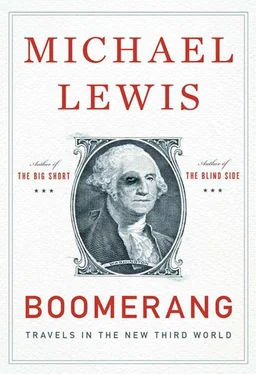I doubt Kyle Bass was ever the sort of person who enjoyed sitting around an office and staring at a computer screen. He enjoys the unsettled life. We hopped into his Hummer, decorated with bumper stickers (God Bless Our Troops, Especially Our Snipers) and customized to maximize the amount of fun its owner could have in it: for instance, he could press a button and, James Bond–like, coat the road behind him in giant tacks. We roared out into the Texas hill country, where, with the fortune he’d made off the subprime crisis, Kyle Bass had purchased what amounted to a fort: a forty-thousand-square-foot ranch house on thousands of acres in the middle of nowhere, with its own water supply, and an arsenal of automatic weapons and sniper rifles and small explosives to equip a battalion. That night we tore around his property in the back of his U.S. Army jeep, firing the very latest-issue U.S. Army sniper rifles, equipped with infrared scopes, at the beavers that he felt were a menace to his waterways. “There are these explosives you can buy on the Internet,” he said, as we bounded over the yellow hills. “It’s a molecular reaction. FedEx will deliver hundreds of pounds of these things.” The few beavers that survived the initial night rifle assault would wake up to watch their dams being more or less vaporized.
“It doesn’t exactly sound like a fair fight,” I said.
“Beavers are rodents,” he said.
Whatever else he was doing, he was clearly having fun. He’d spent two and a half years watching the global financial system, and the people who ran it, confirm his dark view of them. It didn’t get him down. It thrilled him to have gotten his mind around seemingly incomprehensible events. “I’m not someone who is hell-bent on being negative his whole life,” he said. “I think this is something we need to go through. It’s atonement. It’s atonement for the sins of the past.”
Once again a hedge fund manager had been more or less right, and the world had been more or less wrong. Now seemed as good a time as any to pose the question that had nagged at me for more than two years. Here you are, I said, in so many words, an essentially provincial hedge fund manager in Dallas, Texas, whose entire adult life has been lived within a few miles of this place. You speak no foreign languages. You seldom travel abroad. You are deeply patriotic: your biggest philanthropic cause is wounded veterans. You hardly know anyone who isn’t American. How did it even occur to you to start spinning theories about the financial future of these distant countries?
“It was Iceland that got me going,” he said. “I’ve always been interested in Iceland.”
“But why?”
“Did you ever play Risk as a kid?” he asked. “I loved playing Risk. And I would always put all of my armies on Iceland. Because you could attack anybody from there.”
The belief that he could attack anyone from Iceland had led Kyle Bass to learn whatever he could about Iceland, and to pay special attention when something happened in Iceland. He found out, for instance, that Iceland was held up by geographers as an example of a country with a special talent for survival against long environmental odds. “We kept saying, ‘These banks are out of business.’ But the government kept saving the banks,” he said. “And right in the midst of this Iceland went broke. And I thought, Wow, that’s interesting. How, after a thousand years of getting things right and overcoming all these natural obstacles, did they get it so wrong?”
I had my answer. His interest had started with a board game. It was ending with another kind of board game. And Iceland was, once again, a good place to start.
I

WALL STREET ON THE TUNDRA
Just after October 6, 2008, when Iceland effectively went bust, I spoke to a man at the International Monetary Fund who had been flown in to Reykjavík to determine if money might responsibly be lent to such a spectacularly bankrupt nation. He’d never been to Iceland, knew nothing about the place, and said he needed a map to find it. He has spent his life dealing with famously distressed countries, usually in Africa, perpetually in one kind of financial trouble or another. Iceland was entirely new to his experience: a nation of extremely well-to-do (No. 1 in the United Nations’ 2008 Human Development Index), well-educated, historically rational human beings who had organized themselves to commit one of the single greatest acts of madness in financial history. “You have to understand,” he told me, “Iceland is no longer a country. It is a hedge fund.”
An entire nation without immediate experience or even distant memory of high finance had gazed upon the example of Wall Street and said, “We can do that.” For a brief moment it appeared that they could. In 2003, Iceland’s three biggest banks had assets of only a few billion dollars, about 100 percent of the country’s gross domestic product. Over the next three and a half years the banking assets grew to over $140 billion and were so much greater than Iceland’s GDP that it made no sense to calculate the percentage of it they accounted for. It was, as one economist put it to me, “the most rapid expansion of a banking system in the history of mankind.”
At the same time, in part because the banks were also lending Icelanders money to buy stocks and real estate, the value of Icelandic stocks and real estate went through the roof. From 2003 to 2007, while the value of the U.S. stock market was doubling, the value of the Icelandic stock market multiplied nine times. Reykjavík real estate prices tripled. In 2006 the average Icelandic family was three times as wealthy as the average Icelandic family had been in 2003, and virtually all of this new wealth was, in one way or another, tied to the new investment banking industry. “Everyone was learning Black-Scholes” (the option-pricing model), says Ragnar Arnason, a professor of fishing economics at the University of Iceland, who watched students flee the economics of fishing for the economics of money. “The schools of engineering and math were offering courses on financial engineering. We had hundreds and hundreds of people studying finance.” This in a country the size of Kentucky, but with fewer citizens than greater Peoria, Illinois. Peoria, Illinois, doesn’t have global financial institutions, or a university devoting itself to training many hundreds of financiers, or its own currency. And yet the world was taking Iceland seriously. (March 2006 Bloomberg News headline: ICELAND'S BILLIONAIRE TYCOON "THOR" BRAVES U.S. WITH HEDGE FUND.)
Global financial ambition turned out to have a downside. When their three brand-new global-size banks collapsed, Iceland’s 300,000 citizens found that they bore some kind of responsibility for $100 billion in banking losses—which works out to roughly $330,000 for every Icelandic man, woman, and child. On top of that they had tens of billions of dollars in personal losses from their own bizarre private foreign-currency speculation, and even more from the 85 percent collapse in the Icelandic stock market. The exact dollar amount of Iceland’s financial hole was essentially unknowable, as it depended upon the value of the generally stable Icelandic krona, which had also crashed and was removed from the market by the government. But it was a lot.
Iceland instantly became the only nation on earth that Americans could point to and say, “Well, at least we didn’t do that .” In the end, Icelanders amassed debts amounting to 850 percent of their GDP. (The debt-drowned United States has reached just 350 percent.) As absurdly big and important as Wall Street became in the U.S. economy, it never grew so large that the rest of the population could not, in a pinch, bail it out. Each one of the three Icelandic banks suffered losses too large for the nation to bear; taken together they were so ridiculously out of proportion that, within weeks of the collapse, a third of the population told pollsters that they were considering emigration.
Читать дальше













